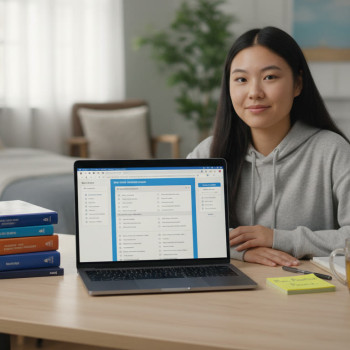Understanding Why Language/Culture Placement Matters at Tufts
When you arrive on a college campus, your language placement can shape your first-year experience: what classes you take, how confident you feel in discussions, and even which study groups you join. For students headed to Tufts, Advanced Placement (AP) scores often play a role in placement decisions. This blog walks you — students and parents — through what to expect, how to interpret AP results for language and culture placement, and practical next steps to make the most of your learning journey.

Why placement, not just credit, is the goal
College language sequences are about more than checking boxes. Placement determines whether you build foundations, polish conversational fluency, or dive into advanced literature and culture. Proper placement maximizes learning efficiency — you avoid repeating what you already know and skip ahead to richer, more challenging material.
How AP Scores Typically Influence Placement
AP exams demonstrate college-level achievement in a subject. For many language programs, AP scores are one important input into placement; some schools award course credit for high scores, others use scores strictly for placement, and some combine AP scores with departmental placement exams or interviews. While institutional practices vary, here are common patterns students encounter.
- AP Score of 5: Often eligible for the highest placement or course credit; sometimes allows direct entry into advanced or upper-division language courses.
- AP Score of 4: Frequently places a student into intermediate or high intermediate courses; may earn some credit depending on the school’s policy.
- AP Score of 3: Commonly places students into beginning-advanced or intermediate courses; credit is less certain, and departmental assessment may be required.
- AP Score below 3: Usually suggests taking introductory college courses or departmental placement exams to assess readiness.
Important note: These are general patterns. Specific placement policies — especially whether scores translate into course credit or just placement — are determined by each university. It’s a good idea to confirm exact Tufts policies through official channels when preparing your schedule.
Example: How a Student Might Use an AP Language Score
Imagine Maria, who scored a 4 on AP Spanish Language and Culture. At many schools this could place her into an intermediate Spanish course rather than the first-year sequence. That placement saves time and lets Maria take courses focused on Hispanic literature, culture, or content-area learning (like Spanish for Health Professions) sooner.
Tufts-Specific Considerations (How to Approach Them Cautiously)
Universities periodically update placement rules, equivalencies, and credit thresholds. For families preparing for Tufts:
- Expect AP scores to be considered, but also expect the department to value demonstrated ability — through placement tests, interviews, or sample writing/speaking tasks.
- Be prepared to take a departmental placement exam or speak with a language faculty adviser. Departments want to ensure that your course aligns with both your skills and learning goals.
- Understand that a high AP score might grant credit that reduces required coursework, but students often choose to continue in language study for depth, minor/major requirements, or study-abroad preparation.
Because university policies change, treat the statements above as strategic guidance rather than fixed rules. Use them to form smart questions when you contact Tufts’ language department or academic advising office.
Actionable Steps Before You Arrive
Follow these practical steps to ensure your AP scores and placement process work for you:
- Collect and organize your AP score report. Have the actual scores (and essays, if applicable) available when you communicate with the department.
- Read Tufts’ current language placement guidance on the official departmental or registrar pages (confirm the date on their pages!).
- Plan to take any departmental placement tests offered — these are often short and reveal the professor’s expectations.
- Consider whether you want credit or proficiency. Sometimes students with AP credit still opt to take an additional course to reach higher proficiency for majors or study abroad.
- Prepare a brief self-assessment (reading, writing, listening, speaking) to share with advisors if asked — clarity helps them place you better.
Preparing a Personal Placement Summary
Create a one-page summary describing your language background: years studied, immersion experiences (travel, family, after-school programs), AP score, and what you want to achieve (major, minor, study abroad). This makes advising conversations productive and shows initiative.
What to Do If Your AP Score Doesn’t Place You Where You Hoped
It happens — an AP score doesn’t always reflect the full range of your language abilities. If your placement seems conservative, remember there are constructive steps forward:
- Ask about a placement re-evaluation. Many departments allow a quick oral or written assessment to confirm level.
- Consider a summer refresh course or self-study to bridge gaps (targeted grammar, vocabulary, and speaking practice work quickly).
- Take a structured course at the placed level and then request permission to test into the next level mid-semester if you progress quickly.
Many students feel surprised at first, but with focus and guided practice they accelerate. This is where tailored tutoring can make a big difference — for example, Sparkl’s personalized tutoring offers 1-on-1 guidance, tailored study plans, and expert tutors who can help target the particular skills (speaking practice, listening comprehension, composition) that placement exams prioritize.
Comparing Placement Options: Credit vs. Placement Only
Some students aim to convert AP success into course credit (to graduate earlier, build a more flexible schedule, or pursue other majors), while others prioritize higher-level placement to continue language learning. Use the table below to compare these paths and the typical trade-offs.
| Option | Typical Benefit | Potential Trade-Offs |
|---|---|---|
| AP Credit Awarded | May reduce graduation requirements; frees up time for other subjects or majors. | Missed opportunity for a college-level language sequence if credit exempts you from required classes. |
| Placement Without Credit | Allows entry into higher-level classes that build real communicative ability and cultural literacy. | May not shorten your degree timeline; you might still need to take elective credits. |
| Repeat/Refresher Course | Secures firm foundations and fills gaps in speaking/listening that AP exams can miss. | Requires extra time and tuition but yields stronger practical proficiency. |
How to Choose
Decide by asking yourself: Do I want credit and flexibility, or do I want stronger language ability fast? If your goals include study abroad, research, or a language major/minor, prioritize placement that builds skill rather than skipping classes purely for credit.
Study Strategies to Maximize Placement
Whether you’re prepping for a departmental placement test or aiming to get the most out of AP credit, these targeted strategies help you succeed.
- Active speaking practice: Language is a performance skill. Try 15–20 minutes of daily spoken practice — talk about your day, summarize short articles, or record yourself responding to prompts.
- Listening immersion: Build comprehension with news clips, podcasts, music, and short films in the target language. Focus on recurring vocabulary and cultural content.
- Focused grammar clinics: Identify two or three grammar points that cause mistakes and practice them in varied contexts until they become automatic.
- Reading for culture: Read short essays or articles about cultural topics to improve both vocabulary and cultural literacy — a frequent component of placement conversations.
- Mock placement tests: Simulate the format (timed writing, oral interview) to reduce anxiety and reveal weak spots.
Sparkl’s personalized tutoring can be particularly useful here: experienced tutors tailor study plans to your specific AP background, provide realistic mock interviews, and use AI-driven insights to track progress so your practice time is efficient and targeted.
What Parents Should Know and How to Support
Parents can be an enormous asset without taking over. Here are practical ways to help:
- Encourage realistic goals: ask whether their child values accelerated credit or deeper proficiency.
- Help organize documents: AP score reports, course descriptions, and any correspondence with the university should be accessible.
- Support study habits: quiet study time, affordable tutoring options, and gentle accountability help students use their time wisely.
- Advocate for communication: encourage students to reach out to language department advisors early — the universities respond well to informed, proactive students.
Real-World Examples and Scenarios
Here are short vignettes that show realistic outcomes and choices students make.
Scenario 1: Sophisticated But Shy — Ravi
Ravi scored a 5 on the AP French Language exam but felt nervous about speaking. He used departmental placement to enter an advanced course but also scheduled weekly conversation practice with a tutor. Within one semester he became comfortable contributing in class and later joined a study abroad semester — his AP score opened doors, but extra speaking practice sealed his success.
Scenario 2: Credit-First Strategy — Leah
Leah earned a 5 on AP Spanish and chose to accept credit to free her schedule for a STEM minor. She later regretted not taking a university-level course for speaking practice, so she enrolled in an upper-level Spanish culture seminar in her sophomore year to regain depth and cultural context.
Scenario 3: Re-evaluation Boost — Jamal
Jamal received a 3 on AP German and was placed into a mid-level course. Unhappy with the placement, he requested an oral re-evaluation and demonstrated stronger conversational ability than his test suggested; the department moved him up one level and recommended tutoring to shore up grammar — a tailored path that matched his goals.
Checklist: Before Orientation
Use this checklist to arrive organized and confident.
- Order and confirm official AP score reports are sent to the college.
- Read the Tufts language placement webpage or departmental guidance and note deadlines for placement tests.
- Prepare a one-page language background summary.
- Plan 2–4 weeks of targeted refresh practice if you haven’t used the language recently.
- Identify whether you want credit, placement, or both — this will guide your conversations with advisors.
FAQs Students Ask About AP and Language Placement
Q: Do AP scores always give me college credit?
A: Not always. Many institutions award credit for high scores, but policies vary by school and department. Some schools keep the credit but still require departmental placement for course sequencing. Always verify the specific policy.
Q: What if my AP score is old or I haven’t used the language recently?
A: If years have passed since you took the AP exam, skills may have faded. Departments often prioritize current proficiency, so be prepared for placement assessments and consider a refresh before arrival.
Q: Can tutoring help me change my placement?
A: Yes. Focused, targeted tutoring can improve speaking, listening, and writing fast. Tutors who specialize in placement assessments can run mock interviews, correct recurring mistakes, and help you present your best proficiency to evaluators. Sparkl’s personalized tutoring — with 1-on-1 guidance and tailored plans — is particularly well suited for students aiming to confirm or upgrade placement.
Final Thoughts: Be Strategic, Not Rushed
Your AP score is a strong indicator of preparation, but successful placement is about communication: what you can do with the language now, what you want to learn, and how you plan to use it in college. Treat the placement process as an opportunity: assess your goals, practice intentionally, and use available resources — including personalized tutoring if you need targeted support.
Before making final decisions, reach out to Tufts’ language department or academic advising to confirm the current placement process and how AP scores are handled. Policies evolve, and the right information will help you make choices that fit your academic and personal goals. Good luck — with the right preparation, your language journey at Tufts can be one of the most rewarding parts of your college experience.
















No Comments
Leave a comment Cancel